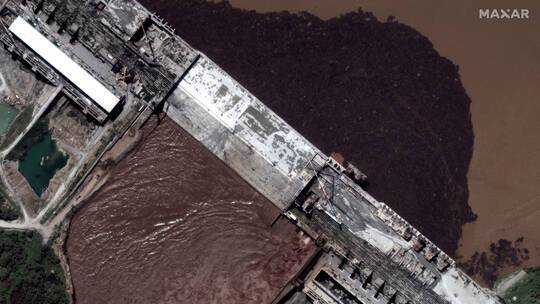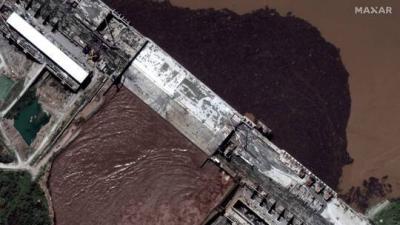Egypt and Sudan's representatives emphasized, in a press conference following a United Nations Security Council session discussing the Grand Ethiopian Renaissance Dam crisis on Thursday, the necessity of a "binding legal agreement" to protect their interests. Meanwhile, Ethiopia accused Egypt and Sudan of "hindering negotiations." The Security Council member states pledged to "continue consultations" regarding the resolution proposal presented by Tunisia earlier, as the session concluded without a vote on the bill.
**Security Council's Role**
Egyptian Foreign Minister Sameh Shoukry stated during the press conference that his country expects a positive role from the Security Council in resolving the Ethiopian dam crisis, stressing that Egypt "will protect its people's rights." Shoukry mentioned that "Egypt and Sudan have shown flexibility in negotiations, unlike the Ethiopian side which has not demonstrated goodwill in reaching an agreement," describing Addis Ababa's stance as "obdurate," which has led to a decade of failed negotiations, jeopardizing "peace in Africa." He called on the Security Council to "shoulder its responsibility in accordance with the UN Charter, free from all considerations, to reach a binding agreement before the second filling of the dam."
Regarding the opposition from some countries in the Security Council to discuss this issue, Shoukry stated, "These countries should provide us with the reason for their reluctance," adding, "We are talking about an important matter that relates to existential issues." He indicated that the proposal put forward by Tunisia is a "means to resolve this dispute through preventive diplomacy," emphasizing that Egypt's recourse to the Security Council aimed at "reaching a political solution." He affirmed Egypt's support for all "international efforts" to find a political resolution but stressed that Egypt "will protect its people's rights and its water security."
When asked about the possibility of military action, Shoukry clarified that Egypt "will continue to engage in negotiations." He noted that Egypt "did not oppose Ethiopia's construction of the dam," contrary to what the Ethiopian Minister of Irrigation stated during the session, but insisted on the necessity of ensuring Egypt's water rights, affirming that Egypt "will not accept indefinite negotiations; they must occur within a specified timeframe." On past negotiations, Shoukry mentioned that "there was progress towards a solution, and an agreement could have been reached, but the Ethiopian minister did not provide a reason for Ethiopia's rejection of Kinshasa’s (meeting held last April regarding the file), which could have led to an agreement."
**Advisory Mechanism**
Sudanese Foreign Minister Maryam Al-Sadiq Al-Mahdi, in her press conference, welcomed the support of all parties to reach a "binding legal agreement" regarding the dam, noting "Ethiopia's refusal to enter into a legal agreement, seeking only an advisory mechanism." She indicated that "Sudan initially relied on the African Union to reach an agreement, but the African Commissioner informed us that the African Union needs to strengthen its position through international support," stressing the need to "support the mediation of the African Union." She added: "What we heard in the Security Council session was positive and encouraging," noting that "the Ethiopian Minister of Irrigation sent a nearly threatening message to Egypt and Sudan three days prior, declaring they would begin the second filling phase of the dam, which strengthened our request for this session."
Al-Mahdi addressed "fears among some regarding discussing this issue in the Security Council," asserting that "this is not merely a water issue, but a matter of a state using water as a weapon to threaten its neighbors," referring to Ethiopia. She emphasized that "the Sudanese position aligns with the Egyptian one," but noted that "Sudan is the country closest to the dam, and the impact on us is greater; the High Dam protects Egypt, whereas we have nothing to protect us."
The minister criticized the Ethiopian Minister of Irrigation Seleshi Bekele's remarks during the session, stating he "attempted to distort the facts when he said there is a problem between the riparian countries and the downstream countries."
Al-Mahdi expressed her optimism that the Security Council would address this issue responsibly, adding, "This is the right time for the Security Council to resolve this issue and build trust."
**Not a Nuclear Reactor**
Ethiopian Minister of Water, Irrigation, and Energy Seleshi Bekele defended his country's concerns regarding the dam during the Security Council meeting, emphasizing that Ethiopia "is dealing with a hydropower dam based on its expertise, not building a nuclear reactor." He stated that Ethiopia "is constructing these reservoirs to store water, which will continue to flow to the downstream countries," confirming that this water "provides livelihoods and electricity to millions of Ethiopians, and the Nile River belongs to all the countries through which it flows." The Ethiopian minister stressed his belief that there is no need to bring the dam issue to the Security Council, highlighting the importance of this project in providing electricity and job opportunities for his citizens. He claimed that "Ethiopia is always willing to negotiate, and Egypt and Sudan have hindered the negotiations," noting that currently "all the dams in the region are being filled, which coincides with the rainy season, expected to last until the end of September, while some areas are experiencing floods," referring to the second filling of the dam.
**Second Filling of the Dam**
The Security Council discussed the crisis surrounding the Grand Ethiopian Renaissance Dam between Ethiopia, Egypt, and Sudan, at the request of Cairo and Khartoum, following Ethiopia's commencement of the dam reservoir's second filling this week. Ethiopia reaffirmed that the dam issue does not threaten international peace and security and therefore does not necessitate a Security Council meeting, while Egypt and Sudan consider operating the dam without an agreement a threat to both countries. Representatives of member states urged the three nations to overcome their differences and reach an agreement under the auspices of the African Union. Cairo and Khartoum sent their foreign ministers to participate in the Security Council session, while Addis Ababa sent its Minister of Water and Irrigation. Many diplomats in the Council are hesitant to intervene in the dispute beyond Thursday's meeting, fearing it may set a precedent allowing other countries to seek the Council's help in water disputes, according to Reuters.




